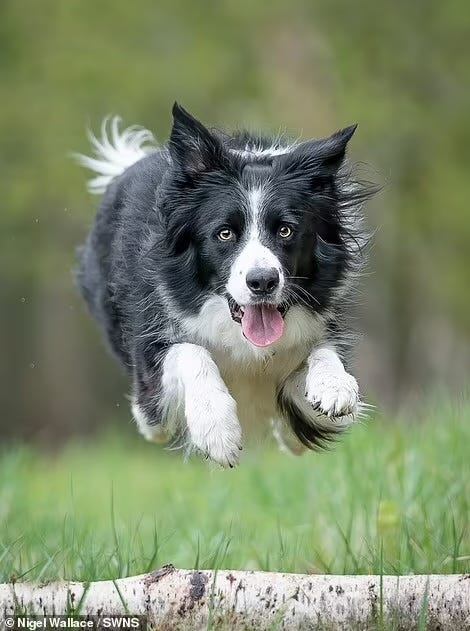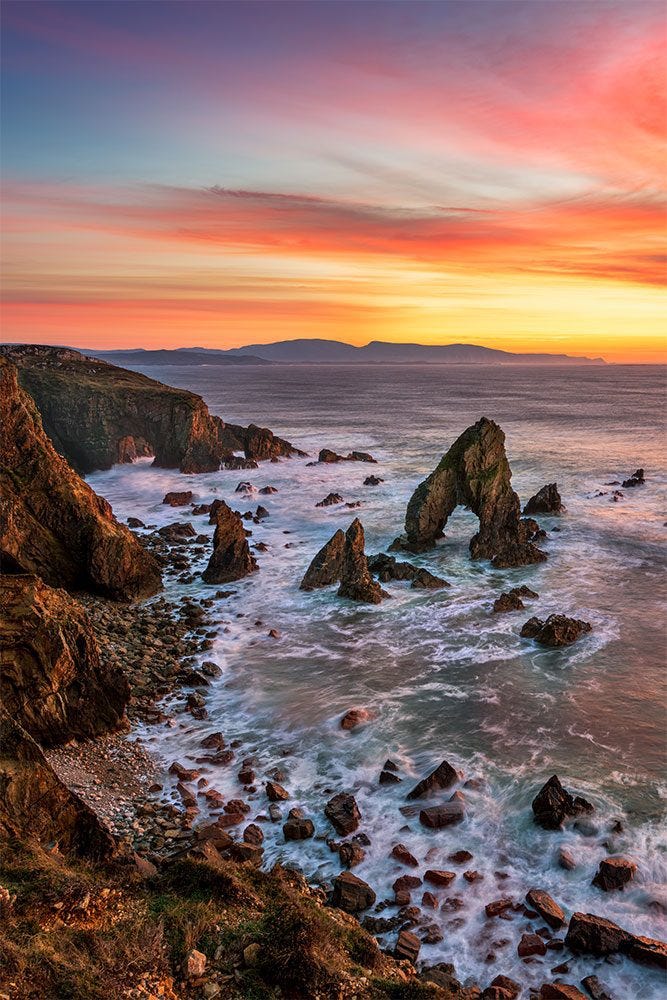by Richard Conniff

The sun was shining over the Atlantic when I arrived at the end of what had been a wet, stormy September day. I was staying the night at a hostel on Crohy Head about five miles from Dunglow, County Donegal. Inside, there was a turf fire and tea, and I had already put in many miles on foot. But the sun drew me out of doors again as soon as I had warmed myself a bit.
The hostel stood on a high spot above pastures running down to the rocks and the water. Clambering over a stone wall, I walked slowly down through the grass. A stream nearby made a sound like schoolchildren murmuring, but the overgrowth hid it completely. Distracted by the water, I didn't notice until the last moment the black dog racing down on me. It ran with a crazy, bucketing speed, and it leaped up at me almost before I had spotted it.
I have always been good with dogs, and I found I was particularly compatible with those in the west of Ireland. It was easy. The dogs there generally look alike and share the same quiet temperament; they are bred to herd sheep. "You seldom get a cross sheepdog,” a Mayo farmer had told me, as his dog rested the top of its head against my knee. I hadn't met a cross one yet, and so I didn't panic when the dog came at me.
It twisted in midair, landed at my feet, and was up again immediately, leaping and turning. Like a sheepdog, it didn't growl or bark, but I'd never seen one so wild and frenetic. Most of them I had come across in Ireland were content to sit listening and watching in the corner of a field or to wait patiently in a farmhouse for their meal of potato skins and milk. I saw by the mad, happy look in this dog's eyes that it wanted a tussle. I offered it my arm. Then I wrestled and boxed with it and spun it around, letting it leap for my hand and the sleeve of my jacket. It was skinny and stood only knee-high, so I was able to toss it about without much effort.
The sheepdog started playing other games with me, trying to make me run. It charged me, cutting and bobbing. It dashed down the hill and then came back a bit to tease me on, leaping out of reach each time I drew near. After running tight circles around me it bolted out of sight, only to appear a few moments later on a knoll two fields away. Its speed and energy startled me. It didn't leap the stone walls with the compact forward motion of a horse. Instead, it took them with an insane springiness that seemed to leave it suspended in the red sunlight high above the wall.
I followed the dog across the fields, playing the game. When I stopped to catch my breath by the ruins of a church, the dog darted in and out of the vacant doors and windows, calling me back to the chase. It drew me on insistently until we got to the bottom of the field, which surmounted a sheer, thirty-foot cliff.
A finger of the Atlantic ran beneath the cliff, and the sea whirled and spat and washed around the rocks below. I paused to take in the scene. The sun, a great red ball, was easing down into the sea. It lit up the red-and-brown cliff face, the rich green grass, the gray stone ruins. Everything in sight was timeless, as if it had not changed in the centuries since the Spanish Armada smashed to pieces on these shores.
But the dog had no interest in ruins. It ran down the irregular rocks to the sea like a house dog going down the back stairs. It was as if the dog could have done it blindfolded. It stopped only to look at me curiously. Twice it came back up onto the grassy headland to urge me on. I didn't move at first. I didn't trust the way the sea rolled into the little inlet and then went sucking back out. Was it a rising or a falling tide? How deep was the water around the rocks?
The dog ran down to the water's edge and continued on, stepping from one rock to another, into the middle of the inlet, where the sea was all around it. It made the trip slowly, looking over its shoulder as if to instruct me. Then once again it returned to me on the headland. There was really nothing to be afraid of, I thought. The weather was fine. There was still plenty of daylight. The dog would be my guide.
I climbed down slowly, unsure of my footing. The dog ran ahead with its characteristic abandon, stopping at intervals for me to catch up. I slipped and fell once, and it came back to inspect me with its gray-blue eyes. It pronounced me well and then stood behind, urging me on.
I looked again at the swirling water and at the clear sky. I thought of Ireland's weather, "changeable as a baby's bottom.” Only that afternoon, on the Bloody Foreland, the country's northwestern tip, I had watched this same sea lashing at the rocky coast in a great, white, boiling fury. A blinding rain had whipped in over the low farmland, tearing at the hand-stacked oat ricks. "There's nothing from here till you get to America," one fellow had told me, "so the sea has plenty of room to work up a rage."
From its perch on a rock a few feet away, the dog looked back at me expectantly. The red sun showed it handsomely, all black,,with those penetrating eyes. It waited for me. I wondered, only half-jokingly, if it was some agent of the sea gods, leading me away from the safety of land. I had been told of demon cats in Irish folklore. Were there demon dogs, too? In the un-Anglicized Irish, my family name (O Conduibh) means "Son of a Black Hound." Was this dog the agent of some personal Irish destiny, some retribution due my ancestors who had lived in the west of Ireland long ago?
I stepped out onto the rock. The dog turned, and with that characteristic springiness, leaped one rock farther out. Then it turned and waited. When I hesitated too long, it came back to draw me on. And so I followed it from rock to rock. It wasn't satisfied until I had come to the last rock in the little archipelago. We stopped, with the sea rushing around us and cliffs on either side, and at last it sat down like a sheepdog, staring quietly straight ahead.
I followed its gaze, peering anxiously into the west for a squall rolling in from America, but the Atlantic had taken on a glassy evening calm.
The dog was watching the sunset.
I was puzzled and maybe also a little disappointed. Much as I feared it, part of me was actually longing for something otherworldly, even demonic, in the animal world. I had devoted myself to the plain facts of biology and evolution, and yet I still wanted some larger, mythic connection. Maybe it was just a Pleistocene memory, another holdover from our hunter-gatherer history. I wanted to join the dance of fear, worship, curiosity, delight in which the lives of people and animals twine endlessly together. And here this damned dog was handing me--what?--a postcard.
And yet it was a perfect spot. At the mouth of the inlet there was no distraction, nothing to obstruct our view. I settled down and, after a time, accepted that maybe this was the dance, or as much of it as I would ever know: a couple of odd creatures side by side on a rock traveling through space and warming themselves by a distant fire. The sun lit up a great red path straight across the sea. We watched silently as it settled down into the ocean. Then, in the dusk, the dog led me slowly back over the rocks and up onto the headland. Someone was calling when we reached the road. The dog's ears went up, and we parted as abruptly as we had met.





What a great story. Dogs are remarkable creatures and Donegal is a spectacular place.
It’s been a long, long time since I was working in the bookstore in Kennebunkport and read this piece (from Sports Illustrated, was it?) My dad was so proud and sent copies to all the family, saying you were on your way to a great career. Of course reading this piece is even more pleasurable now as I am far more capable of fully appreciating it. Congrats!